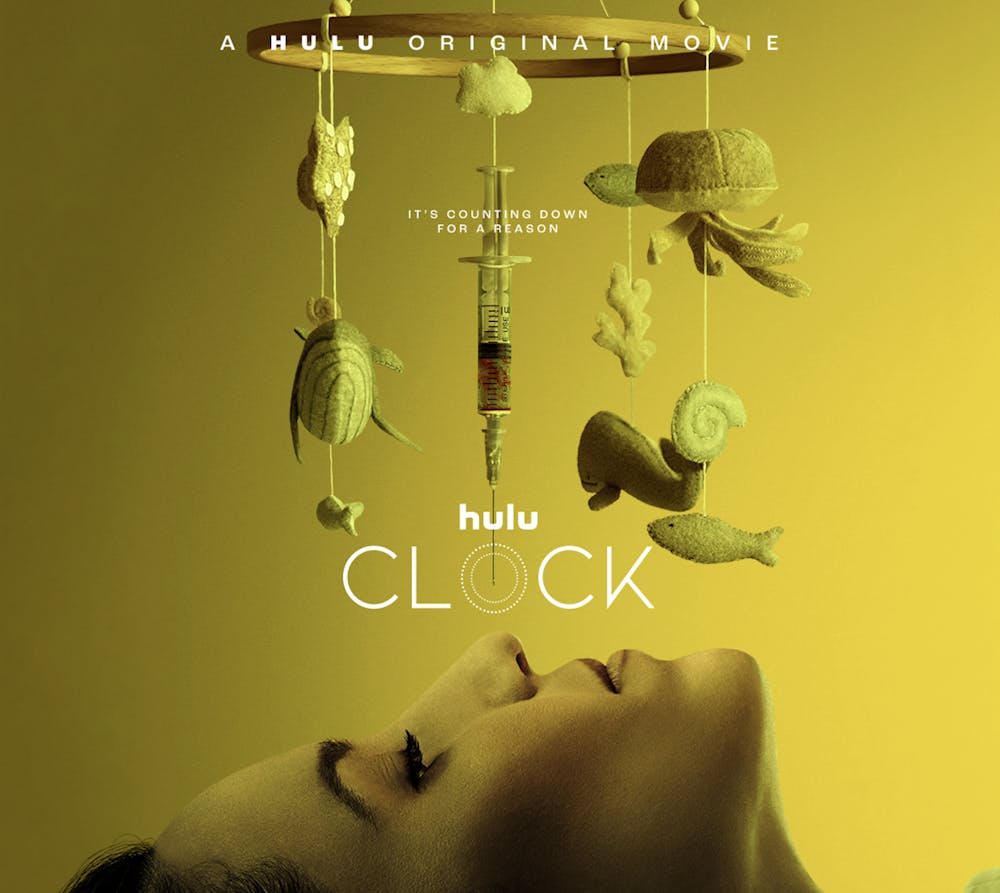This review contains spoilers.
As a diehard “Glee” fan who dreams of living in a world where Lea Michele isn’t the only original Glee Club member who still finds consistent work, I was elated to find out the one and only Dianna Agron would be starring in the brand-new horror movie “Clock.”
The film’s premise is simple: Ella, played by Agron, is very clear about not wanting to have kids. But facing pressure to beat her biological clock as she nears age 40, Ella decides to enroll in a clinical trial that claims it will induce baby fever. Soon, she realizes that the trial uses sinister techniques to instill the desire to procreate, forcing her to decide if these dark, irreversible consequences are worth having a baby she never originally wanted.
Agron gives a phenomenal, nuanced performance as a woman who never claims to hate kids, but rather recognizes that she already feels fulfilled and wants to avoid bringing a child into a world filled with so much pain. The movie shines the brightest anytime Agron breaks into a monologue, debating what she wants and reckoning with the pressure to conform to societal standards.
Unfortunately, the rest of the cast fell flat, serving as cardboard cutouts in Ella’s life instead of genuine human beings with which the audience can connect. The talents of Melora Hardin, who is known for her role “The Office,” are wasted as a pseudo-antagonist whose true intentions are never fully revealed. Hardin does her best to portray a sly and slithering villainess, but the screenplay limits her to being a suspense-building firework whose fuse never goes off.
The true villain of the story is Ella’s father, who constantly guilts her for not carrying on the family line. Still, his brutal murder at the end of the film didn’t feel deserved due to lack of nuanced exploration into the inner workings of their father-daughter relationship.
One thing the film does effectively, however, is portraying how baby pressure is placed on women from all parts of their lives: parents, doctors, best friends, the media and more. The most satisfying part of the film is when it is revealed Ella’s seemingly-supportive husband was conspiring to have Ella join the clinical trial all along and he is summarily stabbed in a place no man wants to be stabbed.
One of the film’s biggest short-comings is that it can’t decide what genre it is. Hulu categorizes it as “horror, thriller,” but fails to recognize that these are two distinct genres. Sure, thrillers can be scary and horror can be thrilling, but the film doesn’t have enough respect for the tropes it employs, so it ends up being a lackluster blend of the two genres. The thriller-heavy first half throws in a cheap jump scare when Ella kills a spider, seemingly to remind us that we are supposed to be scared. In the second half, however, some truly disturbing body horror could scar viewers who didn’t realize what kind of movie they signed up for.
An impressive film-making technique the movie pulled off is the use of color, which becomes progressively duller as Ella slips further into medically-induced insanity, an eerie mark of horror. It happens ever so slowly that one doesn’t realize it is happening, until the vibrancy suddenly returns at the film’s climax, providing viewers with the ultimate dopamine rush.
The whole film is predicated on the idea that women are forced to face the pressure of a biological clock, but it stuffs clock metaphors so far down your throat that you will never want to wear a watch again. The loud ticking noises throughout the film are more grating than convincing, and when Ella gets into a brawl with her family’s grandfather clock, it feels silly rather than cathartic.
The film’s main message is clear, poignant and effective, but ambition gets the best of it when it tries to battle with existentialism. The film’s final scene as Ella meets her very first ‘ancestor’ – the first fish to ever crawl out of the ocean millions of years ago – is over the top, wacky and undermines the real plight that women have faced for millennia.

Eric Burchill '23 (he/him/his) is the Digital Director for the Campus. He previously served as a copyeditor and online editor.
Eric is from Palm Beach, FL and is majoring in Psychology with minors in Japanese and Religion. He loves horror movies, pop music, animals, Oreos, and Survivor.




